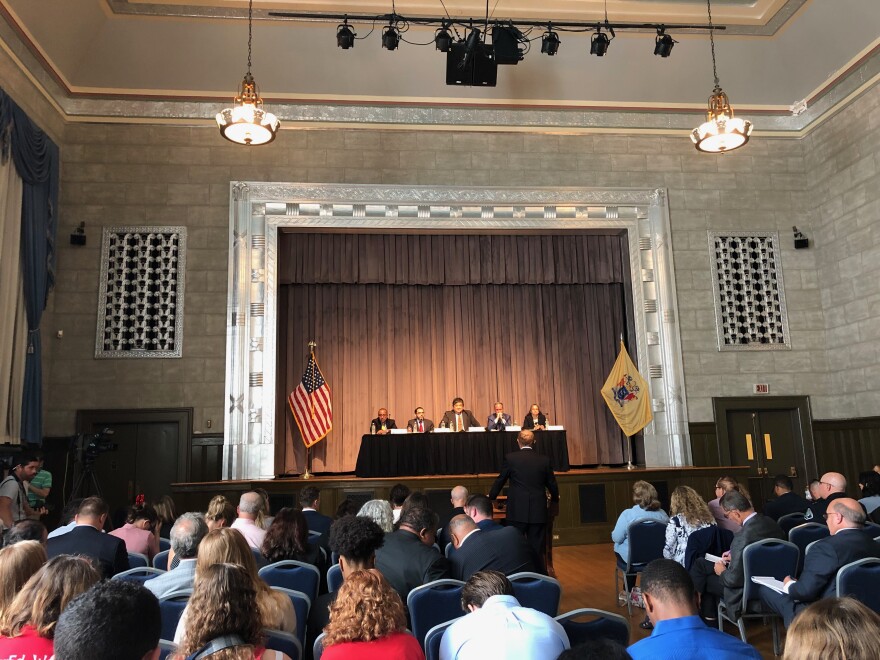Boosters and critics of New Jersey’s controversial tax incentive program came out to speak Tuesday during a public hearing in Trenton held by the state task force investigating the programs.
Gov. Phil Murphy created the task force to look into a system he said lacked oversight under the previous administration and needs to be overhauled.
Several speakers at Tuesday’s hearing agreed with Murphy’s position, but others said the generous tax incentives have helped lure businesses to some of New Jersey’s most distressed cities that would have otherwise lacked development.
“A few years ago, there was no opportunity. There was nothing to look forward to,” said Curtis Jenkins, Camden City Council president. “But that’s changed.”
The city has seen a development boom since the Economic Opportunity Act made it easier and more lucrative for companies to relocate to Camden.
But some of those companies are now in the crosshairs of the task force.
Officials have uncovered evidence that suggests some firms may have lied on their applications for the taxpayer-funded awards.
Several of those companies have ties to South Jersey businessman and Democratic power broker George Norcross, who has sharply criticized Murphy’s investigation. Norcross sued to stop the task force’s work, but a state judge is letting the investigation proceed.
Still, Norcross and his top legislative ally state Senate President Steve Sweeney are political foes of Murphy, and critics have said the task force investigation is nothing more than a political attack.
“Making the tax incentives debate political is fraught with danger to the economic health of our state,” said former state Sen. Ray Lesniak, who helped craft the tax incentive programs.
Many who testified said the political infighting was not the point. Opponents suggested the program was rife with self-dealing that benefitted insiders and rewarded politically-connected companies that do little to improve the communities where they locate.
“This is ridiculously poor stewardship of our tax dollars,” said Justin Goldsman, chair of Our Revolution – Essex County. “It is quite frankly, on this very happy Independence Day week, taxation without representation.”
Haddon Township resident Roberta Reavey said a new building on the Camden waterfront that will house three of the tax break recipients — Conner Strong & Buckelew, NFI, and the Michaels Organization — will not benefit residents because workers are too far from city amenities.
“They can’t go and get lunch at a restaurant downstairs. That would be some economic development. They can’t go to a bodega there,” Reavey said. “People that are working in that building aren’t even parking on the street — they’re parking in free parking.”
The hearing also provided new details on the suspension of Holtec International’s $260 million tax credit.
A ProPublica/WNYC investigation found that the company had been barred from doing work with the federal government for 60 days in 2010, even though it claimed on its certified application that it never had been.
The debarment stemmed from the admission of a Tennessee Valley Authority employee, who was Holtec’s contact at the authority, that he had not disclosed certain outside payments he received.
At Tuesday’s hearing, task force attorney Jim Walden provided new details on the case that were contained in an Officer of the Inspector General report.
The OIG found that Holtec had paid Symonds $50,000 through a separate company under the guise of compensating Symonds’ wife for investigating thefts at U.S. Tool & Die Inc., a Holtec subcontractor. But Symonds wife never provided the services, according to the task force.
Walden instead suggested that Holtec had paid Symonds the money, given him a lavish, all-expenses-paid trip to Philadelphia, and made offers of future employment in order to maintain the company’s contract with the TVA.
“Essentially the OIG found a bribe,” Walden said.
After being interviewed by OIG, Symonds agreed to record a phone call with Holtec president and CEO Krishna P. Singh.
OIG later interviewed Singh, who admitted to having dinner with Symonds and discussing employee thefts with him but denied paying Symonds or ordering anyone else to.


